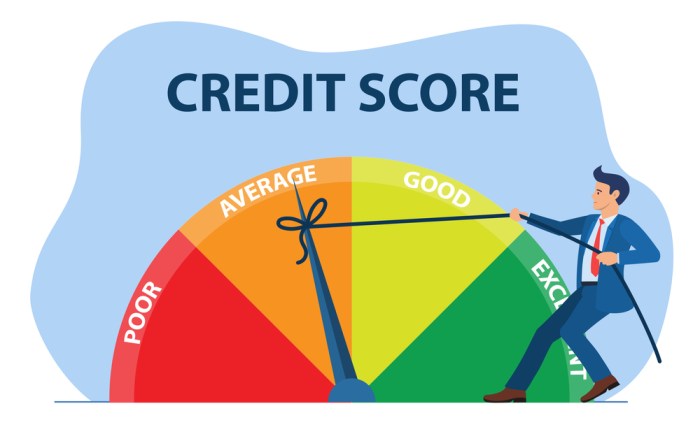Picture this: You’re cruising down the financial highway of life, but suddenly hit a roadblock due to a not-so-great credit score. Fear not, because in this guide, we’re about to revamp your credit score game with some top-notch strategies and insights that’ll have you cruising towards that financial freedom you’ve been dreaming of.
Get ready to dive into the world of Credit score improvement like never before, as we break down the key aspects and secrets that can transform your financial future.
Importance of Credit Score Improvement
Having a good credit score is crucial for maintaining financial health. It reflects your creditworthiness and can impact various aspects of your financial life.
Lower Interest Rates on Loans
Improving your credit score can lead to lower interest rates on loans such as personal loans, auto loans, and mortgages. Lenders use credit scores to assess the risk of lending money to you. A higher credit score indicates lower risk, which can result in more favorable terms and lower interest rates.
Approval for Credit Cards and Mortgages
A better credit score increases your chances of being approved for credit cards, mortgages, and other financial products. Lenders are more likely to trust borrowers with higher credit scores, as it demonstrates responsible financial behavior. With a good credit score, you can access better credit card offers, higher credit limits, and favorable mortgage terms.
Factors Affecting Credit Score

Understanding the key factors that influence your credit score is crucial for improving your financial health and stability. Let’s delve into the main components that impact your credit score.
Payment History
Your payment history is one of the most significant factors affecting your credit score. Making timely payments on all your credit accounts, such as credit cards, loans, and mortgages, positively impacts your credit score. On the flip side, missing payments or making late payments can significantly lower your credit score. It’s essential to prioritize paying your bills on time to maintain a healthy credit score.
Credit Utilization
Credit utilization refers to the amount of credit you are currently using compared to the total amount of credit available to you. High credit utilization, where you are using a large percentage of your available credit, can negatively impact your credit score. It’s recommended to keep your credit utilization below 30% to maintain a good credit score. Be mindful of how much credit you are using and aim to keep it low to improve your credit score.
Credit Inquiries and Types of Credit Used
Credit inquiries occur when lenders or creditors check your credit report when you apply for new credit. Multiple credit inquiries within a short period can lower your credit score, as it may indicate to lenders that you are taking on too much debt. Additionally, the types of credit you use also impact your credit score. Having a healthy mix of credit accounts, such as credit cards, loans, and a mortgage, can positively impact your credit score. It’s important to manage your credit inquiries and diversify the types of credit you use to improve your credit score.
Strategies for Improving Credit Score
Improving your credit score is essential for financial stability and access to better borrowing opportunities. By following these strategies, you can boost your credit score and improve your overall financial health.
Pay Bills on Time
One of the most important factors affecting your credit score is payment history. Make sure to pay all your bills on time, including credit card payments, loans, and utilities. Late payments can significantly lower your credit score, so set up reminders or automatic payments to ensure timely payments.
Keep Credit Card Balances Low
Another key factor in determining your credit score is credit utilization, which is the amount of credit you are using compared to your total available credit. Keeping your credit card balances low, ideally below 30% of your credit limit, can help improve your credit score. Paying off your balances in full each month is the best way to keep your credit utilization low.
Monitor Credit Reports for Errors
Regularly monitoring your credit reports is essential for identifying any errors or inaccuracies that could be negatively impacting your credit score. Request free copies of your credit reports from the major credit bureaus and review them for any discrepancies. If you find any errors, promptly dispute them with the credit bureaus to have them corrected.
Credit Score Improvement Tools
In order to effectively improve your credit score, it is essential to utilize various tools and services that can help you track, understand, and enhance your credit standing.
Credit Monitoring Services
Credit monitoring services are valuable tools that allow individuals to keep track of changes to their credit report, including new accounts opened, inquiries made, and any negative marks. By regularly monitoring your credit report, you can quickly identify any errors or fraudulent activity and take the necessary steps to address them.
Credit Score Simulators
Credit score simulators are useful tools that can help you understand how your financial decisions may impact your credit score. By inputting different scenarios, such as opening a new credit card or paying off a loan, you can see how these actions could affect your credit score. This can help you make more informed decisions when it comes to managing your finances.
Credit Counseling Services
Credit counseling services can also play a crucial role in improving your credit score. These services provide guidance on budgeting, debt management, and credit repair strategies. A credit counselor can work with you to create a personalized plan to help you pay off debt, establish good credit habits, and ultimately improve your credit score over time.